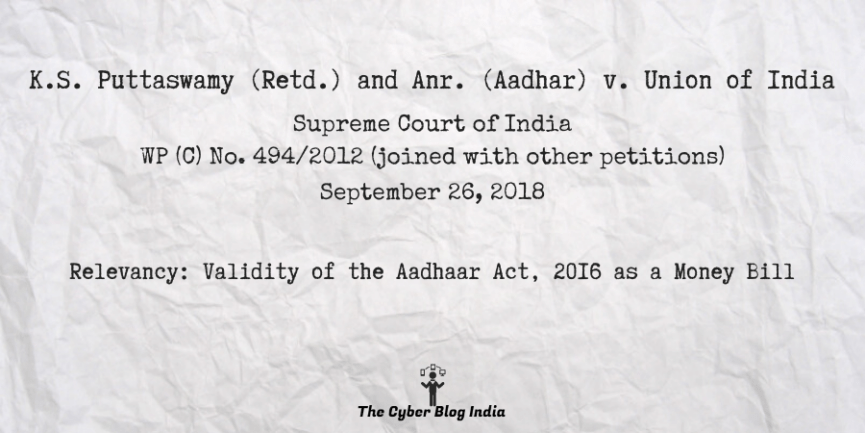K.S. Puttaswamy (Retd.) and Anr. (Aadhar) v. Union of India

K.S. Puttaswamy (Retd.) and Anr. (Aadhar) v. Union of India
(2019) 1 SCC 1
In the Supreme Court of India
WP (C) No. 494/2012 (joined with other petitions)
Before Chief Justice Dipak Misra, Justice A.K. Sikri, Justice A.M. Khanwilkar, Justice Dr D.Y. Chandrachud, Justice Ashok Bhushan.
Decided on September 26, 2018
Relevancy of the case: Validity of the Aadhaar Act, 2016 as a Money Bill
Statutes & Provisions Involved
- The Constitution of India, 1950 (Article 14, 19, 21, 110)
- The Information Technology Act, 2000 (Section 66C, 66D, 72)
- The Aadhaar Act, 2016 (Section 7)
Relevant Facts of the Case
- The Aadhaar project, having the purpose of creating a database with personal and biometric information covering every Indian citizen, have been constitutionally challenged under Article 14, 19 and 21 of the Indian Constitution with respect to the right of privacy.
- Over a billion citizens have registered in the Aadhaar programme, having a 12-digit number as identity, along with eye scans and fingerprints, in order to serve as a unique identification number.
- Registration of Aadhaar has become necessary if you require filing tax returns, opening bank accounts, securing loans, buying and selling properties, etc.
- In the year 2012, Justice K.S. Puttaswamy (Retired) filed a Writ Petition (Civil) No. 494 of 2012 before the Supreme Court, challenging whether the right to privacy was guaranteed as an independent fundamental right due to some conflicting decisions held by the Supreme Court benches, including the Aadhaar case.
- The Government claimed that there was no constitutional right of privacy in the decision of eight judges in P. Sharma v. Satish Chandra ([1954] SCR 1077) and the decision by a majority of four judges in Kharak Singh v. State of Uttar Pradesh ([1964] 1 SCR 332).
- In 2015, the case was brought before a three-judge bench of the court which referred the matter to a larger bench of the court.
- In 2017, the five-judge bench referred the matter to be heard by a nine-judge bench. Over a year later, when they discussed the validity of Finance Act, 2017, it was realized that the Aadhaar issue was not over.
- Later, in 2019, it was taken to a five-judge bench, finally putting an end to the dilemma.
Opinion of the Bench
- The bench noticed that a clear discussion has not taken place on the effect of the word “only” in Article 110(1) and make them understand about the repercussions of having to find a provision and pass it in the “Money Bill” which do not conform to Article 110(1)(a) to (g).
- Justice Ashok Bhushan observed that the legislative intent was that the main provision of the enactment should be either any or all of the sub-clauses from (a) to (f). Here, Aadhaar card aims at providing benefits, subsidies to individuals, and other provisions are just “incidental” compared to the main provision. Therefore, he stated that Aadhaar Bill is satisfied to be certified as a Money Bill.
- Justice Chandrachud had a dissenting opinion and stated that the “Money Bill” must be dealt with the declaration of any expenditure on the Consolidated Fund of India and hence, Section 7 of the Aadhaar Act did not have the effect of a bill qualified to become a Money Bill.
Final Decision
- The bench, in a 4:1 ratio, declared that there has been no violation of the right to privacy and declared that the Aadhaar Act, 2016 is valid. The bench held that Section 7 of the Aadhaar Act, 2016 is the core section and it satisfies the conditions under Article 110 of the Indian Constitution, thereby resulting in the passing of a Money Bill.
